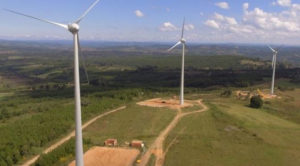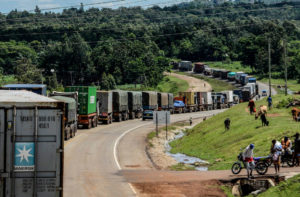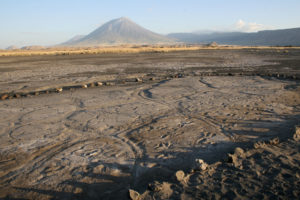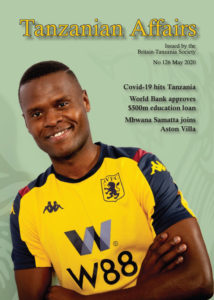by Ben Taylor
The third President of Tanzania, Benjamin William Mkapa, passed away late in the evening of Thursday 23rd July, 2020, after suffering a heart attack at the age of 81.
Mkapa was born in 1938 to a poor family in Mtwara region. He earned a degree in English at Makerere College in Uganda in 1959, after which he went on to study at Columbia University in New York. He later worked as a journalist, including as Editor of The Nationalist and Uhuru (both owned by TANU) and became the founding editor of the state-owned Daily News in 1972, before being appointed the press secretary for the country’s first President, Mwalimu Julius Nyerere, in 1974.
Under President Nyerere and President Ali Hassan Mwinyi, Mkapa held several cabinet posts, including Minister of Foreign Affairs, Minister of Information and Minister for Science, Technology and Higher Education. He also served as Tanzania’s ambassador to the United States.
However, he was, to many, a surprise choice to be the ruling party’s presidential candidate in 1995. Jakaya Kikwete and Edward Lowassa were the favourites for this position, along with Salim Ahmed Salim, who was seen as Nyerere’s preferred choice. Salim declined to run for personal reasons, and Nyerere intervened against Lowassa, citing concerns about the sources of his wealth. This left Kikwete as the strong favourite, at least until a second intervention by Nyerere promoted the less well known Mkapa as a more experienced and responsible figure. In the final round Mkapa won the internal party vote over Kikwete by the narrow margin of 689 votes to 639.
Nyerere campaigned hard for Mkapa in the 1995 election – Tanzania’s first multi-party election since the early 1960s – to the extent that some newspapers treated Nyerere as if he were the nominee, side-lining Mkapa somewhat in their reporting. Mkapa won the election with 62%, well ahead of his closest rival Augustino Mrema on 28%.
As President, Mkapa was noted for continuing President Mwinyi efforts to open up the economy, and most particularly for the large-scale privatisation of state-owned industry and parastatals. He is credited/blamed (delete according to political leanings) for boosting tax collection, instituting austerity measures to curb wasteful expenditure and opening doors to foreign investors. A sleight of hand involving revised definitions allowed Mkapa to do this without either CCM or Tanzania officially abandoning Ujamaa, though it was clear that in practice economic policy under Mkapa owed little to Nyerere’s ideology.
These reforms were welcomed by the World Bank and International Monetary Fund and partly resulted in the cancellation of Tanzania’s foreign debts. Nevertheless, the privatisations in particular were much criticised within Tanzania, and Mkapa later stated that although he had good intentions the policy was not well executed.
Privatisation also led to one of two corruption scandals that tarnished Mkapa’s legacy. It has been widely reported – and denied – that he improperly appropriated to himself and his former finance Minister Daniel Yona the lucrative Kiwira coal mine in Mbeya.
The second scandal was his association with the controversial USD$40m radar system purchased by Tanzania from BAE, said to be incompatible with Tanzania’s needs at the time and which involved a $12m payment to a middleman for “marketing purposes”. This case attracted the ire of the UK International Development Secretary at the time, Clare Short.
President Mkapa also attracted international criticism for his handling of the 2000 elections in Zanzibar, where a CCM President was elected for Zanzibar despite evidence that the opposition party candidate, Seif Sharif Hamad had more votes. The polls were described by Commonwealth observers as a “shambles.” In the aftermath, the army and police shot into crowds of protestors, killing at least 35 and wounding more than 600, and those forces, accompanied by ruling party officials and militias, went on a house-to-house rampage, arresting, beating, and sexually abusing residents, according to Human Rights Watch. Approximately 2,000 temporarily fled to Kenya.
Nevertheless, Mkapa was generally a popular President, and, after stepping down following two terms in 2005, became a respected elder statesman in regional politics. Most prominently, he attempted to act as mediator between Burundi’s government and opposition groups after a disputed 2015 election plunged the country into crisis, though talks went nowhere as the government repeatedly refused to take part.
President Magufuli led tributes to the former President. “I will remember him for his great love for the nation, his piety, hard work and performance in building the economy,” he said, and declared a seven-day mourning period, with all flags flown at half-mast.
Kenya’s President Uhuru Kenyatta sent a message of condolences and mourned the departed Tanzanian leader as an “outstanding East African who worked tirelessly for the integration, peace and progress of the region.”
Justice Augustino Ramadhani, former Chief Justice of Tanzania, died at the Aga Khan hospital in Dar es Salaam in April after a long illness.
Justice Ramadhani’s CV is long and impressive. Most prominently, he has been one of Tanzania’s foremost judges for many years, having served as Chief Justice of both Zanzibar (1978-1979 and 1980-1989) and Tanzania (2007-2010), as well as a judge of the East African Court of Justice (EACJ; 2001-2007) and a judge of the African Court on Human and Peoples’ Rights (ACHPR; 2010-2016) including three years as President of the Court.
But he was also ordained as an Anglican Priest in 2013, where he had previously served as Provincial Registrar of the Anglican Church of Tanzania (2000-2007), and was appointed to lead St Albans Cathedral Church in Dar es Salaam in 2017.
He served as vice chairman of the National Electoral Commission (19932003), vice chairman of the Zanzibar Electoral Commission (2002-2007) and deputy chairman of the Warioba Commission on Constitutional Reform (2012).
And if that wasn’t enough, after obtaining his first degree in 1970, Ramadhani joined the Tanzania People’s Defence Force (JWTZ), reaching the rank of Brigadier General. His roles included JWTZ lawyer, head of Mugulani Camp in Dar es Salaam and head of JWTZ’s Faru Brigade in Tabora. He was involved in the war against Uganda under Idi Amin and then became Judge of the military court in Uganda.
He played piano, and in his youth was a talented basketball player. Born on Zanzibar in 1945, the grandson of Rev Cecil Majaliwa, first African priest of the Universities’ Mission to Central Africa, both his parents were teachers. Ramadhani went to primary school in Mpwapwa before attending the prestigious Tabora Boys High School. At the age of 15, he lost his father to a train crash in Manchester, UK.
He married Lieutenant Colonel Saada Mbarouk, a Muslim, in November 1975. They had four children, Francis, Bridget, Marine and Matthew.
Briefly, in 2015, Ramadhani’s name was discussed as a potential President of Tanzania, with various newspapers reporting that he was President Kiketwe’s preferred choice as a successor. As a Zanzibari Christian with broad experience and a reputation for integrity, it is easy to see the appeal. He submitted his nomination, but the party committees did not put him on the five-person shortlist.
In his various roles as a jurist, Ramadhani was seen as a passionate protector of the rule of law, and in later years, of democratic rights and freedoms. He was disappointed and privately critical of the country’s direction under President Magufuli.
Nevertheless, President Magufuli led the tributes. “I have received with great sadness the news of the death of the late Chief Justice Augustino Ramadhani,” he said in a statement. “I wish to express my sincere condolences to you, the family of the deceased, all the honourable judges and the staff of the Judiciary of Tanzania.”
Experienced diplomat and serving Minister of Constitutional and Legal Affairs, Augustine Mahiga, died on May 1, 2020 in Dodoma after a short illness, at the age of 74.
Mahiga served as Tanzania’s Minister of Foreign Affairs for four years under President Magufuli (2015–2019) before moving to his final cabinet
Obituaries 47
position. He previously served his country as an army colonel, head of the Tanzania Intelligence and Security Service (TISS), and Permanent Representative of Tanzania to the United Nations from 2003 to 2010. From 2010 to 2013 he was the UN Special Representative and Head of the United Nations Political Office for Somalia.
Mahiga was born in Tosamaganga, Iringa in 1945. He studied in Tosamaganga from Primary level up to High School, then earned a BA in Education at the University of East Africa in Dar es Salaam. He later attained a master’s degree from the University of Toronto and in 1975 a PhD in International Relations from the same institution.
“Despite his advanced age, experience and the high positions he held in government and internationally, Dr Mahiga was a humble and obedient person in the way he fulfilled his responsibilities,’’ said President Magufuli in a statement.
Opposition MP, Zitto Kabwe paid tribute, describing Mahiga as “an outstanding diplomat”.
The outgoing British High Commissioner to Tanzania, Sarah Cooke, described Mahiga as “a wise and experienced diplomat who was a close partner and friend of the UK. My thoughts and prayers are with his family at this very sad time,’’ she posted on Twitter.
Judge Mark Bomani has passed away in early September at the age of
88. He had been receiving treatment for the past month at the Muhimbili National Hospital in Dar es Salaam.
Bomani served as Tanzania’s Attorney General from 1965 to 1976, the first indigenous Tanzania to hold the position, succeeding Roland Brown. He played a big role in advising President Nyerere on the appointment of the first indigenous Chief Justice Francis Nyalali and other judges of the High Court of Tanganyika, currently the High Court of Tanzania.
After serving in the government, Judge Bomani became a senior legal advisory in the United Nations between 1976 and 1990, working towards Namibian independence from South Africa and working to devise an independent legal system for the country. He was also the chief aide to both Julius Nyerere and Nelson Mandela on peace negotiations during the first Burundian Civil War.
In 1993, he chaired the Legal Sector Task Force, which resulted in a comprehensive report on legal sector reform in Tanzania. And in 2007 he was entrusted by President Kikwete to chair a Commission on the operations of the Mining Industry in Tanzania, with a broad scope that encompassed economic benefits, governance of the sector and alleged human rights abuses.
He was also briefly a Commissioner on the National Electoral Commission
– a position he resigned in 1995 in order to seek the CCM nomination as Presidential Candidate. This controversy is still cited today as evidence that the electoral commission is not truly independent.
At various times he was Chair of the Tanzania Broadcasting Corporation (TBC), the Tanzania Extractive Industries Transparency Initiative (TEITI) and the Media Council of Tanzania (MCT).
“I send my heartfelt condolences to the late Bomani’s family and all who in one way or another have been touched by the demised of the retired judge,” said President Magufuli on Twitter.
Former Industry and Trade Minister Iddi Simba passed away in February while receiving medical treatment at the Muhimbili National Hospital’s Jakaya Kikwete Cardiac Institute (JKCI).
Simba, described as “Tanzania’s staunchest proponent of indigenisation policy” and one of Tanzania’s foremost “intellectuals of capital”. He served as Minister of Commerce and then of Industry and Trade under President Mkapa, and as Chair of the Confederation of Tanzanian Industry (CTI), as well as holding senior positions with the African Development Bank and the World Bank.
Born in 1935, Simba grew up in Dar es Salaam where he received his primary and secondary education. He then attended the elite Tabora Boys School and became one of the first university graduates in postcolonial Tanganyika after obtaining a Bachelor of Science in Agriculture in 1961 from Panjab University in Pakistan.
Mr Simba is credited to have conceived the concept of indigenisation, a policy that sought to integrate Tanzanians of Africans descent into the modern economy and economically empower poor Tanzanians. In 1999, he told a gathering of members of the CTI that foreign companies which want to invest in Tanzania will be compelled to identify local partners. “If they cannot do so, the government will help them identify partners because we are now aiming at localising and promoting local participation in investments,” he said.
In June 2003, he published a twenty-page booklet titled A Concept of Indigenisation (Dhana ya Uzawa). The publication prompted the leadership of the ruling CCM, a party which Mr Simba was serving as a member of its National Executive Committee (NEC), to ban its members from using the term indigenisation (uzawa) on the grounds that it had no relation to the party’s 2000 election manifesto.
President Mkapa led the tributes to Mr Simba: “He always held to his position and he lived to be a good fighter for the advancement of the private sector,” said Mr Mkapa.
The last surviving member of the first cabinet of independent Tanganyika, Job Lusinde, died in July at the age of 89.
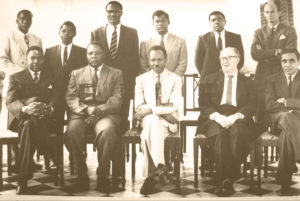
Job Lusinde (standing extreme left) in first cabinet of independent Tanganyika
After early schooling in Dodoma, Lusinde studied at Tabora Boys High School and Makerere University. He returned to Dodoma as a teacher, then served as District Executive Director where he drew the attention of the future President Nyerere.
At a time of the mutiny by soldiers in January 1964, Lusinde was Minister for Home Affairs. Alongside Oscar Kambona, the powerful Defence Minister, he calmed the soldiers who were demanding fast pace of Africanisation. Lusinde was awoken by the rioting soldiers in the early hours and ordered to show where President Nyerere and his vice Rashid Kawawa were hiding. He managed to get into the State House where he found Mama Maria Nyerere and Sophia Kawawa safe. From there, it is said, he communicated directly with all the ministers, pleading with them to stay indoors for their safety. The confusion as to the whereabouts of Nyerere and Kawawa ended after Lusinde, Kambona and Bhoke Munanka traced them in Kigamboni.
For many years, he held the Communications, Transport and Works dockets. In this role, he oversaw several large infrastructure projects including negotiations and construction of the Tanzania-Zambia
Railway (TAZARA), the Tanzania-Zambia Pipeline (TANZAM) and the highway to Zambia. He stood side by side with Mwalimu Nyerere as the President inaugurated one project after another.
He lost his seat in parliament in 1975, after which he served as Tanzania’s Ambassador in China and High Commissioner in Kenya, and later as chair of the Tanzania National Parks Authority (TANAPA).
“There was no blemish on his performance,” said Former Dodoma Mayor Peter Mavunde. “He strived to discharge his roles to utmost perfection. He was my role model, I did not expect that one day I would become a politician, but under his watch, I matured steadily, ultimately becoming a mayor for Dodoma. Many politicians benefited from his wisdom.”
Former personal assistant to Mwalimu Julius Nyerere, Annar Cassam, died in Geneva in July after a long illness.
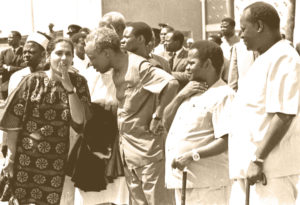
Annar Cassam with President Nyerere
Cassam was never a well-known figure in Tanzania, despite the role she played – certainly far less well-known than Joan Wicken. And yet she played a major role in Nyerere’s presidency, particularly in foreign affairs.
She first saw and heard Nyerere as a student at the London School of Economics (LSE) in the 1960s. After specialising in international law, she went on to Geneva on a fellowship at the International Commission of Jurists until she was asked to return to Tanzania in the 1970s to work at the Foreign Affairs Ministry.
Dar es Salaam was then the headquarters of the African Liberation Committee (ALC) and Tanzania was instrumental in supporting Southern African Liberation Movements. Nyerere invested a lot of time, effort and attention on this, and with her expertise, Cassam ended up working closely with him at State House.
Her role included helping him with translations of all French correspondence, to be with the President when he was meeting French speaking leaders, and to represent the president in meetings with key local actors including revolutionary-minded scholars at the University of Dar es Salaam.
After President Nyerere’s retirement, Cassam left Tanzania to work in Geneva for the United Nations. She maintained a close interest in Tanzania and in Nyerere’s legacy, however, including co-editing a book on Nyerere’s role in Africa’s liberation struggles, published in 2010.
Her co-editor on that book, Chambi Chachage, paid tribute. “One of the lessons I learned from her is the importance of not mincing words and not refraining from challenging the ideas of others, especially when they depart from historical facts,” he wrote. “It was indeed an honour and a privilege to collaborate with someone who christened herself my ‘old shangazi’.”
